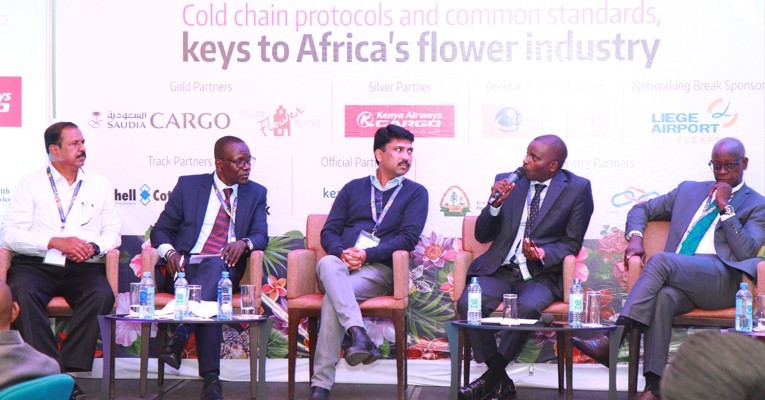FROM MAGAZINE: Adopting Technology & Global Benchmarking
Setting standards in cold chain processes and integration between small scale farmers were identified as keys to achieving the full potential of Africa’s flower and perishable industry at the recently held Flower and Perishable Logistics Africa conferences in Nairobi, Kenya.

Setting standards in cold chain processes and integration between small scale farmers were identified as keys to achieving the full potential of Africa’s flower and perishable industry at the recently held Flower and Perishable Logistics Africa conferences in Nairobi, Kenya.
Shalini Nair
The third edition of Flower Logistics Africa (FLA) 2018, organised by Logistics Update Africa, held at Nairobi focused on benchmarking cold chain logistics and adopting advanced technology.
Revolving around the core theme of ‘Cold Chain Protocols and Common Standard: Keys to Africa’s Flower Industry’, the event witnessed a cross-section of participants from the entire value chain of flower trade.
The participants of the day-long conference deliberated on the typical challenges faced by the flower industry as a whole. The discussions revolved around the need for standardisation that will enhance exports and gain traction for Kenya’s flower industry in the global market. The changing paradigms like the entry of e-commerce players are expected to drive flower markets in the coming years. The flower trade players may have to look towards the ‘Look East’ policy as demand from China will increase in the coming years.
Peter Musola, cargo commercial manager for Kenya Airways (KQ), emphasised on KQ’s commitment to providing fresh networking opportunities. “Kenya Airways Cargo is expanding our cool chain facility to deal with the over demand during peak seasons. We are also expanding our warehouse infrastructure to accommodate demand,” he said. In regards to KQ launching direct flights from Nairobi to New York, Musola added, “We are looking into partnerships with the John F Kennedy Airport with our recently launched flights to New York to enable access for our flowers to Miami, Toronto and Vancouver.”
While discussing about setting cold chain protocols and common standards for African flower export, Evans Michoma, manager cargo, Kenya Airports Authority, mentioned, “Plans are underway to launch a cargo service quality surveys for all exporters and importers. This tool will ensure cool chains standards are maintained both at the receiving and loading phases. These results will be publicised for all suppliers for action.”

Srikanth Vadakattu, Director, East African Growers Group of Companies
Efficiency and sustainability in the floral logistics supply chain took centre stage of discussions as participants sought to identify new opportunities that will allow African exporters to compete in global markets. Clement Tulezi, CEO, Kenya Flower Council (KFC), commented, “We are looking more into improving our market access by working closely with other key partners as we aim to remain the main voice for the Kenya flower industry.”
A day after the successful Flower Logistics Africa event, the second edition of Perishable Logistics Africa (PLA) held on November 21 brought key stakeholders in the perishables supply chain. The theme was ‘Collaboration: The Road Ahead to Improve Logistics for Africa’s Perishable Produce’.

(L-R) Wouter Boekee, Global Industry Manager - Agriculture and Fresh, Lufthansa Cargo; Isaac Macharia, GM, KEPHIS; Patrice Ngenga, Standards & Compliance Officer, Fresh Produce Exporters Association of Kenya; Yvonne Otieno, Agriprenuer, Miyonga Fresh Green
The day-long discussions amplified the call to create industry collaborations to improve Africa’s perishable exports through better logistics network and cold chain infrastructure.
Integration between small scale farmers was identified as a key to achieving value proposition throughout the discussions. Dr. Isaac Macharia, GM for phytosanitary services in Kenya Plant Health Inspectorate Service (KEPHIS), mentioned, “We train and advise small scale and aspiring farmers on how to access and prepare for the market by providing them with market dynamics.
We also link them with associations of help in the supply chain.” Wouter Boekee, the global industry manager for agriculture and fresh, Lufthansa Cargo, added to the conversation by saying, “All partners in the supply food chain need to more open with their processes. This will give us better insights on the farmers and seasons to prepare adequately.”
Kenya is the leading exporter out of Africa with over 16,000 tonnes perishables per month. Ken Mbogo, regional director Africa, Saudia Cargo, stated that they handle approximately 25 percent of those goods. While discussing on how data can improve transport and logistics for Africa, he mentioned that the airline is taking advantage of their online customer surveys to get insights that influence change in their day-to-day operations.
Inspired by the Agenda 2063 of the African Union (AU), Single African Air Transport Market (SAATM), which was launched to liberalise and unify the African skies, PLA held vibrant discussions on shipper’s expectations versus air cargo value proposition in perishable transport by air. Jane Ngige, the National Coordinator for Kenya Horticultural Council (KHC), was keen to note that better information and communication is needed to keep upto date with the dynamics of logistics.
Liege Airport’s Cargo sales manager, Eric Gysen, stated, “We have found other ways to attract commodities and carriers. We have implemented central facilities that are profitable for the business and still very affordable for small growers or shippers.”

A delegate at the conference asks a question during the panel discussion
The two-day event was supported by Holland Flower Alliance, Saudia Cargo, Kenya Airways Cargo, Kenya Airports Authority, Liege Airport, Cargolux and Mitchell Cotts. The conference was also supported by industry associations such as KFC, Cool Chain Association (CCA), KEPHIS, Kenya International Freight and Warehousing Association (KIFWA) and The International Association of Horticultural Producers (AIPH).



